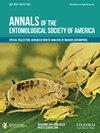以圆茧蜂(膜翅目:茧蜂科)为寄主的阿卡塔蜂生活史
IF 1.8
3区 农林科学
Q1 ENTOMOLOGY
引用次数: 1
摘要
在北美,圆形巨蝽是生产紫花苜蓿种子的主要商业传粉媒介。经管理的圆轮田鼠种群易受几种致死因素的影响,包括寄生蜂的攻击。其中一种寄生蜂,阿卡斯塔沃克蜂,是一种多伏特黄蜂,它的侵扰可以摧毁蜜蜂种群。为了制定防治策略,需要详细了解以圆轮田鼠为寄主的玉米田鼠的生活史。本研究的目的是:(1)以圆尾蚜预蛹为寄主,描述圆尾蚜的生命周期;(2)确定圆尾蚜的发育基础温度,并提出一个度日模型。首先,将150 ~ 300只小黄蜂成虫与60只圆形小黄蜂预蛹(10 ~ 20只雌性黄蜂/4只蜜蜂预蛹)接触,并在其上产卵。监测后代发育(30°C)至成年期。我们确定了12个不同阶段的M. acasta生命周期,在平均19.5天的样本中观察到。其次,每个装有圆形圆孔虫蛹和卵的小瓶放置在温度梯度条上(每个温度2个小瓶)。在重复试验中,黄蜂从卵发育到成虫,在30°C条件下平均发育时间为13天。线性回归分析确定发育温度下限为8.55℃。将这一基础温度应用到一个度日模型中,结果显示从卵到成虫的平均积累量为305.8度日。这些结果提供了一个框架,以协助蜜蜂管理者制定蜜蜂控制策略和实施时间。本文章由计算机程序翻译,如有差异,请以英文原文为准。
Life cycle of Melittobia acasta (Hymenoptera: Eulophidae) using Megachile rotundata (Hymenoptera: Megachilidae) as a host
Megachile rotundata F. is the primary commercial pollinator for alfalfa seed production in North America. Managed M. rotundata populations are susceptible to several mortality factors including attack by parasitoids. One such parasitoid, Melittobia acasta Walker, is a multivoltine wasp whose infestations can decimate bee stocks. Details of M. acasta life history using M. rotundata as a host are needed to develop control strategies. Our objectives were (i) to describe the M. acasta life cycle using M. rotundata prepupae as hosts and (ii) to determine the M. acasta developmental base temperature and propose a degree-day model. First, 150–300 M. acasta adults were introduced to 60 M. rotundata prepupae (10–20 wasp females/4 bee prepupae) upon which they oviposited. Progeny development (at 30 °C) was monitored through adulthood. We identified 12 distinct phases of the M. acasta life cycle that were observed among samples over an average of 19.5 days. Second, vials each containing a M. rotundata prepupa with M. acasta eggs were positioned across a temperature gradient bar (2 vials per temperature). In repeated trials, wasp development was tracked from egg to adult where a mean development time for 30 °C was found to be 13 days. A linear regression analysis determined the lower developmental temperature threshold to be 8.55 °C. Application of this base temperature in a degree-day model revealed an average of 305.8-degree-day accumulation from egg to adult. These results provide a framework to assist bee managers in devising M. acasta control strategies and timing their implementation.
求助全文
通过发布文献求助,成功后即可免费获取论文全文。
去求助
来源期刊
CiteScore
4.90
自引率
0.00%
发文量
25
审稿时长
6-12 weeks
期刊介绍:
The Annals of the Entomological Society of America exists to stimulate interdisciplinary dialogue across the entomological disciplines and to advance cooperative interaction among diverse groups of entomologists. It seeks to attract and publish cutting-edge research, reviews, collections of articles on a common topic of broad interest, and discussion of topics with national or international importance. We especially welcome articles covering developing areas of research, controversial issues or debate, and topics of importance to society. Manuscripts that are primarily reports of new species, methodology, pest management, or the biology of single species generally will be referred to other journals of the ESA. The most important criteria for acceptance are quality of work and breadth of interest to the readership.

 求助内容:
求助内容: 应助结果提醒方式:
应助结果提醒方式:


